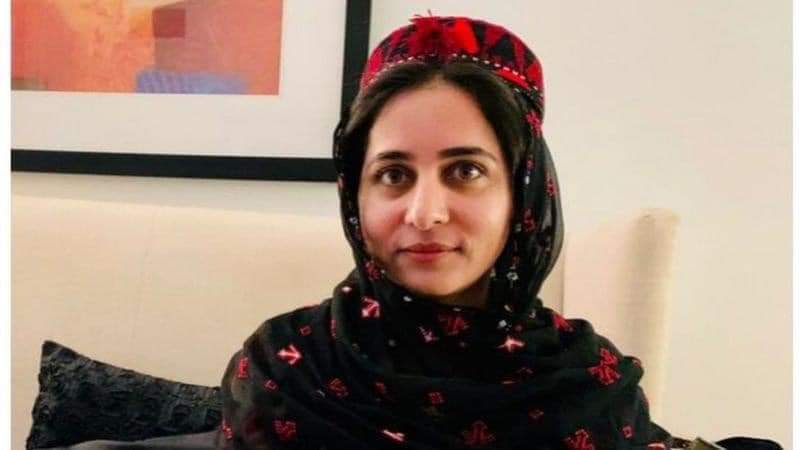In a shocking incident, exiled Baloch human rights activist Karima Baloch has been found dead in Toronto, Canada. After missing for two days, her body has been found at Harbourfront, near a lakeshore in Toronto.
Karima has been one of the towering figures of the Baloch nationalist movement and took refuge in Canada in 2016 after several foiled assassination attempts by Pakistani Army and nation’s government.
An epitome of resistance against Pakistani Occupation of Balochistan, she was working to build a movement against the human rights violations by the Pakistani Army in Balochistan as well as against the growing influence of ISI operatives right under the nose of Canadian administration and security forces. She was also raising her voice on the growing trend of settling of ex-army officers of the Pakistani Army in Canada.
Baloch activists and human rights defenders are criticising the Canadian government for its failure to protect dissidents and are demanding a speedy investigation and trial in the matter. Exiled Baloch leader and the Central Spokesperson of the Baloch Republican Party (BRP) Sher Mohammad Bugti tweeted and said, “The sudden demise of Karima Baloch is certainly no less than a shock. It is the duty of the Government of Canada to investigate the incident and to inform the family and the Baloch nation of all the facts.”
Popular Pakistani feminist Movement Aurat March–recent fame in the feminist world has demanded the Canadian government to probe the matter and tweeted, “We are deeply saddened and disturbed by the murder of Karima Baloch, a human rights defender who was in exile in Canada. Canada must hold a transparent investigation and make the results public. The silencing of Baloch voices must not go unnoticed.”
Though the death of one of the Prominent leaders has given a setback to the Baloch revolutionaries, however, Baloch nationalists believe that the murder of Karima Baloch shall further intensify the freedom movement. Prominent Baloch student leader and Chairman of the Baloch Students Action Committee (BSAC) Dr Nawab Baloch tweeted, “We pay our richest tribute to the iron lady for her role in organizing students’ politics. She remains a role model for generations to come. #KarimaBaloch.”
A number of prominent Pakistani dissidents and activists critical of human rights abuses by the ISI and Pakistani Army have also expressed their grief and mourned her death. Head of Pashtun Tahaffuz Movement and Pakistani dissident Manzoor Pashteen tweeted on the killing and expressed, “Shocked & devastated by the sad news of #KarimaBaloch killing in Canada. Her killing is a huge loss for all the oppressed nations struggling for the right to life & dignity. Better that culprits are arrested & such hounding be stopped. We convey our condolences to the Baloch nation.”
Analysts and human rights defenders argue that the murder is a part of the larger operation of the ISI to kill Baloch dissidents and leaders in exile as this is not the only incident of murder of a Baloch leader in exile, rather, another Baloch dissident Sajid Hussain was also murdered earlier this year in Sweden after he went missing for several days. Similar to Karima Baloch, his body was also later found from a water body. France based journalists and free speech defender organisation Reporters Without Borders found that Hussain’s disappearance and subsequent murder was possibly an organised crime committed by Pakistani agencies ISI and MI.
Hussain was seen as a big threat to Pakistan as his reportage exposed Pakistan’s human rights violations in Balochistan and created embarrassing situations for the country at the global fora. Similarly, Karima Baloch was aggressively leading the women’s resistance against Pakistani oppression. She is credited with popularising the Baloch nationalist movement amongst women and it is believed that the number of women revolutionaries has exponentially increased after Karima rose to prominence. Contributions of Karima Baloch also led to her inclusion in the ‘BBC 100 Women 2016′ list for her contribution to “campaigns for independence for Balochistan from Pakistan.”
The death of Karima Baloch is an incredibly sad day not only for human rights activists but for gender rights activists all around the world. In her address to the 39th session of the UN Human Rights Council, she highlighted the deteriorating condition of gender equality in Pakistan and that Pakistan’s false assurances to the human rights bodies across the world have come only as a guide to cover its staunch belief in centuries-old Islamic doctrines on governance. She continued to strive for improvements in the field of education of girls in Balochistan which has the lowest female literacy rate in the entire country. She also effectively highlighted the growing cases of enforced disappearances by Pakistani security forces in quelling the dissent of Balochs, Pashtuns, and many other persecuted communities.
Similar to her fame amongst the women, she was equally popular amongst the youth as well. She earlier served as the chairperson of the student wing of the Baloch Student Organization — Azad (BSO-A). In fact, Karima, then a young Psychology student, became the President of the organisation after its leader Zahid Baloch was abducted. To check the popularity of Karima Baloch and counter her influence, the Pakistan government banned the BSO-A and designated it as a terrorist organisation

